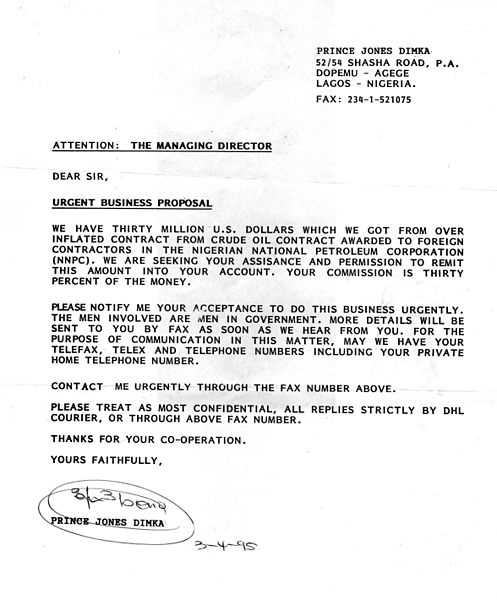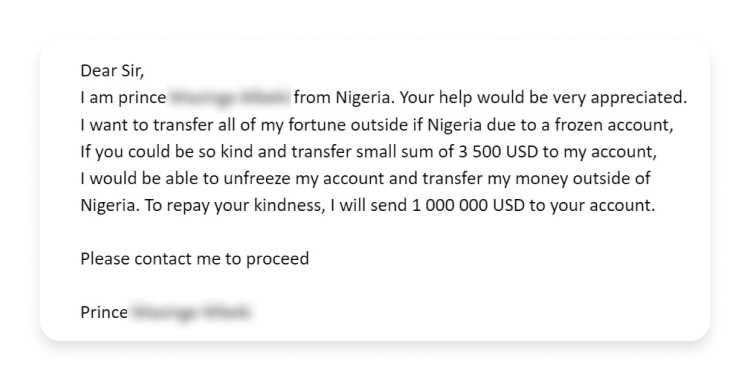Nigerian Letter Scam: Definition and Tips to Avoid It
The scammers typically claim to have a large sum of money that they need help transferring out of Nigeria due to political instability or other reasons. They promise the victim a significant share of the funds in exchange for their assistance. However, in order to proceed with the transaction, the scammers require the victim to pay various fees, such as legal fees, taxes, or bribes.
Unfortunately, the promised funds never materialize, and the victim is left with nothing but financial loss and disappointment. The scammers often disappear once they receive the requested fees, making it nearly impossible for victims to recover their money.
Tips to Avoid Nigerian Letter Scam:
1. Be skeptical of unsolicited emails or letters from individuals claiming to have a large sum of money that they need help transferring.
3. Research the sender’s name, email address, or phone number online to see if there are any reports of scams or fraudulent activities associated with them.
4. Be cautious of any requests for upfront payment or fees, as legitimate transactions typically do not require such payments.
5. Consult with a trusted financial advisor or law enforcement agency before proceeding with any financial transactions involving large sums of money.
By staying informed and vigilant, you can protect yourself from falling victim to the Nigerian Letter Scam and other similar fraudulent schemes.
Section 3: Definition of Nigerian Letter Scam

The scammer will often promise a significant financial reward to the victim in exchange for their help, usually in the form of a percentage of the funds being transferred. However, in order to proceed with the transaction, the victim is required to provide personal and financial information, as well as make upfront payments for various fees and expenses.
Unfortunately, the promised funds do not exist, and the victim ends up losing their money and potentially becoming a victim of identity theft. The scammers are skilled at manipulating their victims and creating a sense of urgency and trust, often using elaborate stories and fake documents to support their claims.
To avoid falling victim to the Nigerian Letter Scam, it is important to be cautious when receiving unsolicited emails or letters from unknown individuals. Never provide personal or financial information to anyone you do not trust, and be skeptical of any offers that seem too good to be true.
| Warning Signs of Nigerian Letter Scam: |
|---|
| 1. Unsolicited emails or letters from strangers claiming to have a large sum of money to transfer. |
| 2. Requests for personal and financial information, including bank account details and identification documents. |
| 3. Demands for upfront payments or fees for various reasons, such as legal expenses or taxes. |
| 4. Poor grammar and spelling in the communication, as scammers often operate from countries where English is not the first language. |
| 5. Pressure to act quickly and keep the transaction confidential. |
By being aware of the warning signs and exercising caution, you can protect yourself from falling victim to the Nigerian Letter Scam.
Tips to Avoid Nigerian Letter Scam

Protecting yourself from falling victim to the Nigerian Letter Scam requires awareness and caution. Here are some important tips to keep in mind:
1. Be skeptical of unsolicited emails or letters
Most Nigerian Letter Scams start with an unsolicited email or letter that promises a large sum of money in exchange for your help. Be wary of any unexpected communication that seems too good to be true.
2. Verify the sender’s identity
Before engaging with any email or letter, verify the sender’s identity. Look for inconsistencies in the email address, poor grammar or spelling, and suspicious requests for personal information.
3. Do not share personal or financial information
Never share personal or financial information, such as your bank account details, social security number, or passport information, with anyone you do not trust completely. Legitimate organizations will never ask for this information via email or letter.
4. Research the offer or opportunity
Take the time to research the offer or opportunity presented in the email or letter. Search for information about the company or individual making the offer, and look for reviews or warnings from other people who may have encountered the same scam.
5. Trust your instincts
If something feels off or too good to be true, trust your instincts and proceed with caution. Scammers often use emotional manipulation and urgency to pressure their victims into making hasty decisions. Take the time to think things through and consult with a trusted friend or family member.
6. Report suspicious activity

If you receive a suspicious email or letter, report it to your local authorities and to the appropriate online fraud reporting agencies. By reporting these scams, you can help prevent others from falling victim to the same scheme.
| Key Points to Remember: |
|---|
| • Be skeptical of unsolicited emails or letters |
| • Verify the sender’s identity |
| • Do not share personal or financial information |
| • Research the offer or opportunity |
| • Trust your instincts |
| • Report suspicious activity |
By following these tips, you can protect yourself from falling victim to the Nigerian Letter Scam and other similar fraudulent schemes. Stay vigilant and always prioritize your personal and financial security.

Emily Bibb simplifies finance through bestselling books and articles, bridging complex concepts for everyday understanding. Engaging audiences via social media, she shares insights for financial success. Active in seminars and philanthropy, Bibb aims to create a more financially informed society, driven by her passion for empowering others.
